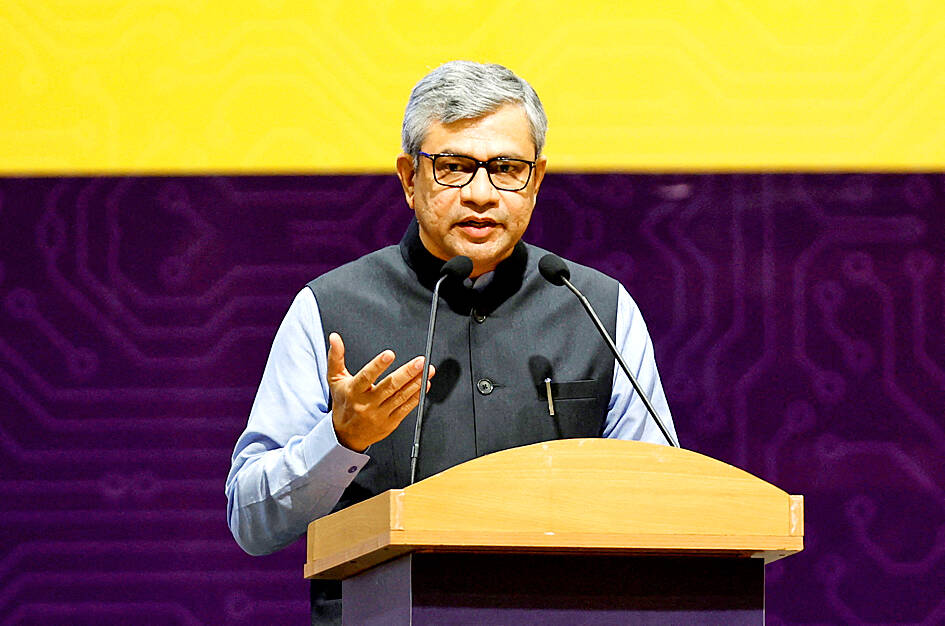India’s government has approved US$15.2 billion worth of investments in semiconductor fabrication plants, including a Tata Group proposal to build the country’s first major chipmaking facility.
Indian Prime Minister Narendra Modi’s Cabinet approved Tata’s plan to build a US$11 billion site that can fabricate about 50,000 wafers per month, Indian Minister of Railways, Communications and Electronics and Information Technology Ashwini Vaishnaw told reporters in New Delhi yesterday.
The Indian government also cleared Tata’s separate proposal for a US$3 billion-plus chip assembly plant, and a packaging venture between Japan’s Renesas Electronics Corp and the Murugappa Group’s CG Power and Industrial Solutions Ltd.

Photo: Reuters
“We will start construction of this plant within 100 days,” the minister said during the briefing, referring to Tata’s fab.
India hopes to attract chip giants to boost its domestic manufacturing sector. The government has offered to shoulder half the cost of any approved projects, up to an initial ceiling of US$10 billion. The semiconductor fund has already helped US memory maker Micron Technology Inc establish a US$2.75 billion assembly facility in Gujarat.
Taiwan’s Powerchip Semiconductor Manufacturing Corp (PSMC, 力積電) yesterday confirmed that it would assist Tata Electronics Pvt Ltd to build India’s first 12-inch wafer fab in Dholera, Gujarat.
The fab construction will begin this year, Powerchip said in a statement, adding that the new facility is expected to create more than 20,000 jobs in India.
Through the cooperation with Powerchip, Tata Electronics, a subsidiary of Tata conglomerate, plans to produce power management ICs, display driver ICs as well as microcontrollers and high-performance computing logic chips as it aims to enter the automotive, computing and data storage, wireless communications, artificial intelligence and other end markets, the Taiwanese chipmaker said.
Semiconductors have grown into a key geopolitical battleground, with the US, Japan and China investing heavily in developing domestic capabilities.
The cooperation between PSMC and Tata is “indeed timely” at this critical moment of the global restructuring of high-tech supply chain, Powerchip chairman Frank Huang (黃崇仁) said in the statement.

SELL-OFF: Investors expect tariff-driven volatility as the local boarse reopens today, while analysts say government support and solid fundamentals would steady sentiment Local investors are bracing for a sharp market downturn today as the nation’s financial markets resume trading following a two-day closure for national holidays before the weekend, with sentiment rattled by US President Donald Trump’s sweeping tariff announcement. Trump’s unveiling of new “reciprocal tariffs” on Wednesday triggered a sell-off in global markets, with the FTSE Taiwan Index Futures — a benchmark for Taiwanese equities traded in Singapore — tumbling 9.2 percent over the past two sessions. Meanwhile, the American depositary receipts (ADRs) of Taiwan Semiconductor Manufacturing Co (TSMC, 台積電), the most heavily weighted stock on the TAIEX, plunged 13.8 percent in

A wave of stop-loss selling and panic selling hit Taiwan's stock market at its opening today, with the weighted index plunging 2,086 points — a drop of more than 9.7 percent — marking the largest intraday point and percentage loss on record. The index bottomed out at 19,212.02, while futures were locked limit-down, with more than 1,000 stocks hitting their daily drop limit. Three heavyweight stocks — Taiwan Semiconductor Manufacturing Co (TSMC, 台積電), Hon Hai Precision Industry Co (Foxconn, 鴻海精密) and MediaTek (聯發科) — hit their limit-down prices as soon as the market opened, falling to NT$848 (US$25.54), NT$138.5 and NT$1,295 respectively. TSMC's

ASML Holding NV, the sole producer of the most advanced machines used in semiconductor manufacturing, said geopolitical tensions are harming innovation a day after US President Donald Trump levied massive tariffs that promise to disrupt trade flows across the entire world. “Our industry has been built basically on the ability of people to work together, to innovate together,” ASML chief executive officer Christophe Fouquet said in a recorded message at a Thursday industry event in the Netherlands. Export controls and increasing geopolitical tensions challenge that collaboration, he said, without specifically addressing the new US tariffs. Tech executives in the EU, which is

In a small town in Paraguay, a showdown is brewing between traditional producers of yerba mate, a bitter herbal tea popular across South America, and miners of a shinier treasure: gold. A rush for the precious metal is pitting mate growers and indigenous groups against the expanding operations of small-scale miners who, until recently, were their neighbors, not nemeses. “They [the miners] have destroyed everything... The canals, springs, swamps,” said Vidal Britez, president of the Yerba Mate Producers’ Association of the town of Paso Yobai, about 210km east of capital Asuncion. “You can see the pollution from the dead fish.